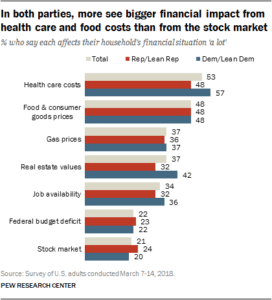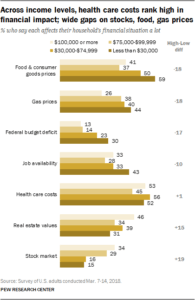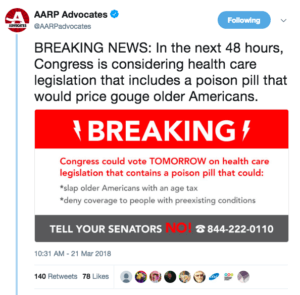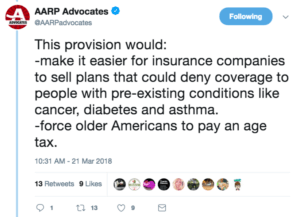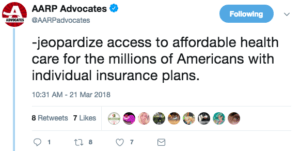Republicans Bear 100% of Responsibility for Avoidable Premium Increases Set to Hit Millions of Middle Class Families This Fall
BEFORE PRESIDENT TRUMP’S SABOTAGE, THE MARKETS WERE STABILIZING
Trump White House Today Admits The Marketplaces Were Stabilizing. “After an initial adjustment period, insurers’ financial health, as measured by their stock prices, surpassed earlier levels … While insurers initially incurred losses in the ACA marketplaces as they adjusted to new regulations and a relatively unhealthy risk pool, insurers are now profiting on the individual market as well.” [CEA, 3/18/18]
In 2017, Congressional Budget Office Reports: ACA Market Is Stable. “The subsidies to purchase coverage combined with the penalties paid by uninsured people stemming from the individual mandate are anticipated to cause sufficient demand for insurance by people with low health care expenditures for the market to be stable.” [Congressional Budget Office, 3/13/17]
In 2017, S&P Global Reports: ACA Market Will Remain Stable So Long As The Trump Administration Is Not “Disruptive.” S&P Global repeatedly reports that “2016 results and the market enrollment so far in 2017 show that the ACA individual market is not in a ‘death spiral.’ However, every time something new (and potentially disruptive) is thrown into the works, it impedes the individual market’s path to stability.” [S&P Global, 4/7/17]
THEN REPUBLICAN REPEAL ATTEMPTS UNDERMINED THE MARKET
Ongoing Republican repeal attempts throughout 2017 created uncertainty that insurance companies said forced them to hike premiums: “Obamacare markets are undergoing a slow-motion meltdown as Republicans stoke a climate of uncertainty while struggling to agree on their own plan for overhauling American health care.” [Politico, 6/8/17]
AND IF THAT WASN’T ENOUGH, PRESIDENT TRUMP STARTED TO SABOTAGE THE MARKETS, WHILE REPUBLICANS ON THE HILL DID NOTHING TO STOP IT
On October 13, 2017, President Trump Ended Cost Sharing Reductions (CSRs), Payments To Insurers That Help Lower Income Americans Afford Health Coverage In The ACA Marketplace. [Washington Post, 10/13/17]
Kaiser Family Foundation: Lack Of CSR Payments Resulted In Surcharge In Premiums Of 7.1 To 38 Percent. “As shown in Table 1, among those insurers that specify the surcharge on silver plans for the discontinuation of CSR payments, the amount of the surcharge ranges from 7.1% to 38%.” [KFF, 10/27/17]
THEN CONGRESS PASSED A TAX CUT FOR THE WEALTHY AND CORPORATIONS THAT ALSO RAISED PREMIUMS AND WILL TAKE COVERAGE AWAY FROM MILLIONS OF PEOPLE
Last December, Congressional Republicans Passed A Tax Bill That Strips 13 Million Of Insurance And Raises Premiums By Double Digits. “The Senate bill’s repeal of the individual mandate (the requirement that most people get health coverage or pay a penalty) would cause 13 million more people to become uninsured, raising the uninsured rate among the non-elderly from 11 percent to about 16 percent, the Congressional Budget Office (CBO) estimates. It also would raise premiums by an average of 10 percent in the individual market by 2027, according to CBO.” [CBPP, 12/8/17]
Urban Institute Predicts Near 20 Percent Premium Increases Next Year And Millions Of Americans Losing Coverage Due To The Repeal Provision In The Tax Law And Trump Sabotage. According to a study by the non-partisan Urban Institute, Republican health care sabotage is set to artificially inflate premiums by double digits for millions of families this fall. The study forecasts an 18.2% increase in 2019 premiums for Affordable Care Act plans and millions of Americans losing their coverage because the Trump and Congress repealed the individual mandate and the Trump Administration’s proposal to sell junk plans that do not meet ACA requirements. [Urban Institute, 3/14/18]
CONGRESSIONAL REPUBLICANS BROKE THEIR PROMISE TO PASS A STABILIZATION BILL IN 2017
After Being Promised To Have A Stabilization Bill As Part Of The Tax Bill, Sens. Alexander And Collins Issued A Statement Saying They Asked Sen. McConnell To Postpone Stabilization Until 2018. ‘Rather than considering a broad year-end funding agreement as we expected, it has become clear that Congress will only be able to pass another short-term extension to prevent a government shutdown and to continue a few essential programs,’ said the Senators. ‘For this reason, we have asked Senator McConnell not to offer this week our legislation which independent analysts Avalere and Oliver-Wyman say would reduce premiums by about 20 percent for the 9 million Americans who have no government subsidies to help them buy insurance in the individual market. Instead, we will offer it after the first of the year when the Senate will consider the omnibus spending bill, the Children’s Health Insurance Program reauthorization, funding for Community Health Centers, and other legislation that was to have been enacted this week.’” [Alexander and Collins Statement, 12/20/17]
HOUSE REPUBLICANS INDICATED THEY WOULDN’T SUPPORT STABILIZATION
Speaker Ryan Opposed Efforts To Stabilize The ACA Dating Back To October 2017. Last October, Ryan spokesman, Doug Andres, said, “The speaker does not see anything that changes his view that the Senate should keep its focus on the repeal and replace of Obamacare.” [Matt Fuller, Huffington Post Reporter, 10/18/17]
House Conservatives Called Alexander-Murray Stabilization Bill A “Nonstarter.” “House conservatives appear united in opposition to the health care stabilization proposal crafted by Sens. Lamar Alexander and Patty Murray. ‘Right now it’s a nonstarter,’ House Freedom Caucus member Dave Brat said Tuesday during a Conversations with Conservatives press event.” [Roll Call, 10/24/17]
Rep. Tom Cole: “The Idea You’re Going To Vote For Billions Of Dollars To Stabilize A System You Never Supported In The First Place — Pretty Hard To Choke Down.” “In addition to the dispute over abortion language, GOP lawmakers were reluctant to sign off on provisions that shored up the Affordable Care Act, a law they all opposed. ‘Nobody in that room voted for Obamacare, so the idea you’re going to vote for billions of dollars to stabilize a system you never supported in the first place — pretty hard to choke down,’ said Rep. Tom Cole (R-Okla.).” [Washington Post, 3/19/18]
PRESIDENT TRUMP AND SPEAKER RYAN REPEATEDLY TRIED TO DERAIL STABILIZATION NEGOTIATIONS BY ADDING MORE CONSERVATIVE DEMANDS
September 2017: “House Speaker Paul Ryan And The White House Have Informed Senate Republican Leaders That They Oppose A Bipartisan Plan To Stabilize Obamacare Being Written In The Senate.” “House Speaker Paul Ryan and the White House have informed Senate Republican leaders that they oppose a bipartisan plan to stabilize Obamacare being written in the Senate, according to Trump administration and congressional sources, in a clear bid to boost the Senate’s prospects of repealing the health law.” [Politico, 9/19/17]
March 2018: The White House Released A List Of Conservative, Deal-breaking Demands To Stabilization. In the middle of bipartisan negotiations on stabilization, the White House released a list of its conservative demands, including:
- Expanding the Hyde abortion language
- Codifying the Administration’s Short-Term proposal into law that undermine protections for people with pre-existing conditions
- Expanding Health Savings Accounts (HSAs) that is essentially another tax cut for the wealthy
- Imposing an age tax on older Americans by letting insurers charge people over 50 five times more than younger people. [White House Document, obtained by Politico, 3/8/18]
The Hill: White House pushes for conservative changes to ObamaCare fix
Politico: White House pitch to bolster Obamacare includes tough trade-offs for Democrats
Wall Street Journal: Trump Administration Pushes Conservative Goals in Health-Care Market Changes
Vox: The White House might have just blown up the last best hope to stabilize Obamacare
Talking Points Memo: White House Demands Threaten Bipartisan Effort To Bring Down Health Premiums
NOW, THE LATEST REPUBLICAN STABILIZATION PLAN THREATENS PRE EXISTING CONDITIONS AND ESSENTIAL HEALTH BENEFITS



[AARP, 3/21/18]
AND, REPUBLICANS ADDED A PARTISAN POISON PILL THEY KNEW WOULD TORPEDO BIPARTISAN STABILIZATION NEGOTIATIONS
Statements
Sen. Patty Murray: “They’re Moving Further And Further Away From Their Original Goal.” “We’re not going to give them an expansion of Hyde and say that’s a goal we all agree to…They’re moving further and further away from their original goal, which was to make sure people have lower costs and access.” [Washington Post, 3/8/18]
Sen. Patty Murray: “They Keep Throwing Obstacles In.” “If we would just go back to the basic premise here and do what we all agreed to do, we’d be able to get this done.” [Washington Post, 3/8/18]
Speaker Paul Ryan Refuses To Introduce Stabilization Without Restricting Women’s Access To Health Care. “House Speaker Paul Ryan (Wis.) told his GOP conference at a Tuesday meeting that he wouldn’t bring the measures to the floor without accompanying language known as the Hyde Amendment, ensuring taxpayer dollars can’t go toward plans that cover abortions.” [Washington Post, 3/8/18]
Headlines
- Washington Examiner: House Republicans seek anti-abortion protections in Obamacare stabilization bills
- Huffington Post: Another Obamacare Stabilization Bill Is In Trouble, This Time Because Of Abortion
BY REFUSING TO ADDRESS THEIR OWN SABOTAGE WITH BIPARTISAN STABILIZATION, REPUBLICANS NOW BEAR RESPONSIBILITY FOR THE CONSEQUENCES
Lindsey Graham: Republicans “Own The Outcome” On Health Care. “Sen. Graham told Breitbart News, ‘In October, premiums are going up. Obamacare cannot be fixed. It’s going to continue to collapse, and then, we own the outcome. By repealing the individual mandate, which is a step forward in the eyes of the public, we own the issue. We have a responsibility to do something about the collapsing Obamacare system. I believe that we’re going to get blamed more than Democrats because we stopped trying to repeal Obamacare, and to suggest that we don’t own it is just simply politically naive.’ Graham continued, ‘It can hurt us in 2018. It can hurt by our base feeling like we betrayed them. It can hurt us from people suffering from Obamacare, like we don’t have a solution. It will energize Democrats. It can undercut everything we did on the tax cut side.'” [Breitbart, 2/6/18]
Rep. Charlie Dent: Republicans “Own” Health Care Now. “Rep. Charlie Dent (R-Pa.) argued Friday that President Trump was ‘ill-advised’ to end key ObamaCare payments, warning that the GOP now ‘owns’ whatever happens to ObamaCare. ‘I think the president is ill-advised to take this course of action because … we, the Republican Party, will own this,’ Dent, a key House moderate who is retiring from Congress at the end of his term, said on CNN. Asked about Trump’s previous comments blaming problems with ObamaCare on former President Barack Obama, Dent pointed out that Republicans currently control the White House and have majorities in both chambers of Congress. ‘Barack Obama is a former president. President Trump is the president and he’s a Republican, and we control the Congress,’ Dent said. ‘So we own the system now. We’re going to have to figure out a way to stabilize this situation … This is on us.'” [The Hill, 10/13/17]
Washington Post: “The Pottery Barn Rule Comes To Mind: You Break It, You Own It.” “This is not ‘letting’ Obamacare fail. Many nonpartisan experts believe that these active measures are likely to undermine the pillars of the 2010 law and hasten the collapse of the marketplaces. The Pottery Barn rule comes to mind: You break it, you own it. Yes, the plate you just shattered had some cracks in it. But if you dropped it on the ground, the store is going to blame you.” [Washington Post, 10/13/17]
Washington Post: “Trump’s Not Going To Be Able To Avoid Blame For Kneecapping Obamacare.” [Washington Post, 10/13/17]
“After Months Of Pinning The Blame For Obamacare’s Shortcomings On Democrats And Watching His Own Party Fail To Act, President Donald Trump Just Took Ownership Of A Struggle That’s Consumed Republicans For Seven Years.” “After months of pinning the blame for Obamacare’s shortcomings on Democrats and watching his own party fail to act, President Donald Trump just took ownership of a struggle that’s consumed Republicans for seven years. Trump’s decision late Thursday to end government subsidies to insurers to help lower-income Americans afford to use their coverage under the Affordable Care Act was the most drastic step he’s taken to undermine his predecessor’s signature achievement. It also lobbed a live bomb into the laps of Republicans lawmakers 13 months before congressional elections after he publicly berated the party’s Senate leadership for being unable to keep a longstanding promise to repeal the law.” [Bloomberg, 10/13/17]
The American People Agree: President Trump And Congressional Republicans Are Playing Politics With People’s Health Care. A poll conducted last September found that 61 percent of voters believed President Trump was “trying to make the Affordable Care Act fail,” and 64 percent of voters said Trump is “playing politics with people’s health care.” The poll also found that the American people seriously disapprove of how Republicans in Congress are treating health care: 80 percent of voters disapprove while only 20 percent approve. [Garin Poll, 9/5/17]

